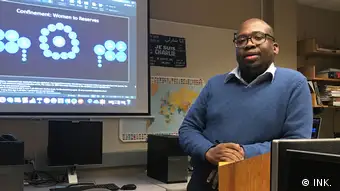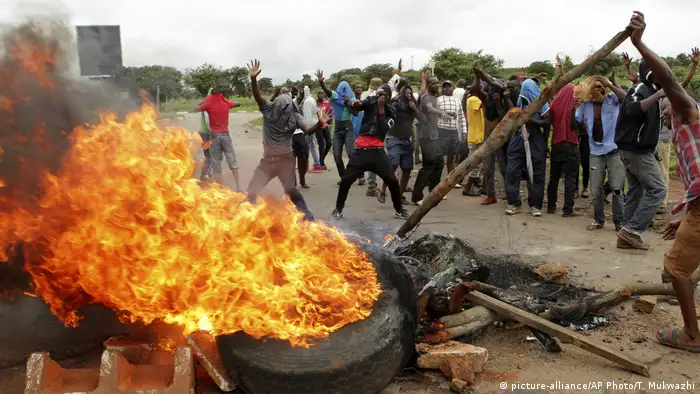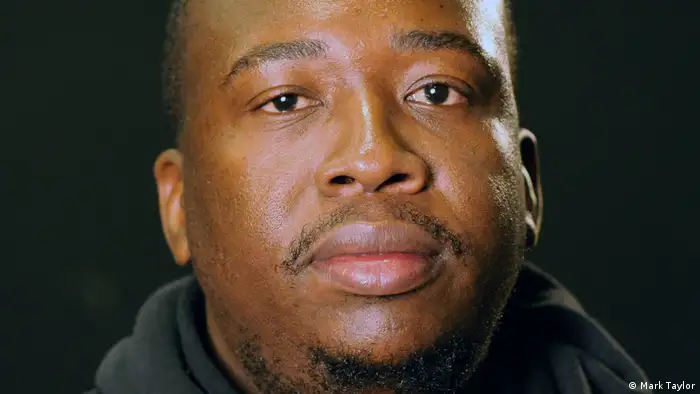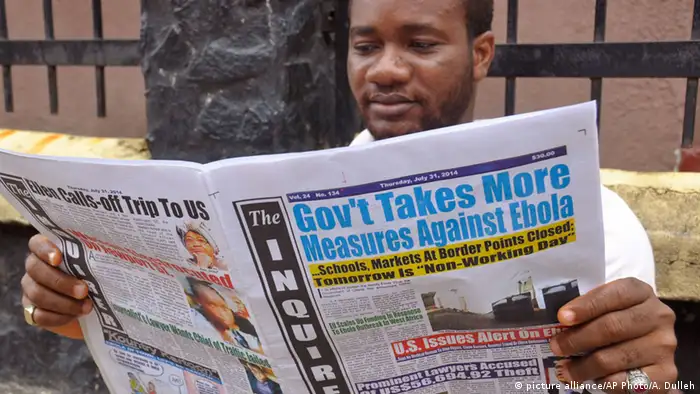GMF
Digitization without monetization: African news media stuck between a rock and a hard place
Ntibinyane Ntibinyane says that African local news outlets need innovation — and money. The founder of the INK Centre for Investigative Journalism highlights that journalism in Africa is facing increasing threats.
DW: How much were media outlets in Botswana hit by the corona-crisis?
Ntibinyane Ntibinyane: If technology was a major disrupter for news outlets, then COVID-19 has been a sweeping tsunami on African economies and the news media. Before the outbreak of COVID-19, newspapers in Africa, including my home country of Botswana, were struggling to survive due to the rise of the internet and the challenging economic environment.
The traditional business model for newspapers underpinned by advertising and circulation was on a free fall. The virus has now forced unprepared media organizations to hurriedly transition to digital platforms.
Read more: Africa's media hit hard by COVID-19 crisis
Are there any opportunities for newspapers in being forced to act so fast with regard to digitization?
First, it is important to stress that most news organizations during the COVID-19 age are churning out more content online than ever before. Many news organizations on the continent have transitioned to digital platforms in the past five months — much more than at any other time in history.
The problem, however, is that they have not figured out how to make money online. They are clueless. News outlets, in particular newspapers, are running out of money and time during this crisis. This forced transition will lead to the deaths of many newspapers on the continent.
Can providing more content online ensure the survival of these newspapers in any way? Would a complete transition to digital be a viable option?
Advertising and sales revenues are plummeting and news organizations are closing operations, laying off staff, and suspending their print operations. So, providing more or less editorial content online is not a survival strategy.
The challenge for African news organizations at this very hour is to find ways to make money online and survive post-COVID-19. This requires innovation not only at the technological level but at policy, strategy, and operational levels. This is urgent.
Read more: Africa's innovative response to internet repression
Does this present growth of digital platforms mean there are more opportunities for democracy to grow and flourish?

Ntibinyane Ntibinyane wants to see African media organizations break free from traditional monetization models
Well, on paper it serves democracy best to have a plurality of news platforms – on and offline platforms. Recently, Africa has seen the mushrooming of online-only news platforms – big and small. Some have gained traction and trust from the public and are doing exceptionally well in holding power to account. The Premium Times in Nigeria and News 24 in South Africa are the best examples here.
But the proliferation of digital news platforms also has the potential to harm democracy, social cohesion, and governance. Some of these platforms are spreading misinformation and conspiracy theories with malicious intent.
So democracy also needs journalism as a watchdog, especially when it comes to investigative journalism. What efforts should be made to save investigative journalism for post COVID-19?
No doubt, investigative journalism contributes to the strengthening of democracy and accountability - and it is indeed endangered in Africa. A lack of resources, draconian laws and growing intolerance are all threats investigative journalists face.
The following needs to be done for the survival of investigative journalism during and post COVID-19: More nonprofit news outlets should be established on the continent. Because they are not under the pressure of having to make a profit. They need increased investment by local and international donor organizations.
Besides nonprofit organizations, donors should fund independent news outlets as well. In addition to donor funding, news outlets should consider building up a grassroots model to fund investigative journalism. News organizations and other stakeholders on the continent should intensify lobbying for the protection of journalists and for repealing draconian laws.

Protests rocked the Zimbabwean capital Harare last year, when the government issued an internet shutdown
How can news outlets and journalists support each other during this present crisis situation?
We need more collaboration between news organizations at the industry and the reporters’ level. News organizations should pool resources and act jointly to find solutions for the problems affecting the industry, and embrace innovation and creativity. On the other hand, reporters on the continent need to work closely together to fight corruption, illicit-financial flows, and the betrayal of public trust by those in power.
Ntibinyane Ntibinyane is a journalist from Botswana. A career reporter with over a decade of experience, he has worked at the Botswana Guardian, The Midweek Sun, and as the editor of the Mmegi newspaper. In 2015, he founded the nonprofit INK Centre for Investigative Journalism. In 2018, he completed a fellowship program at the Reuters Institute for the Study of Journalism at the University of Oxford, where he investigated the impact of non-profit journalism in Africa. Ntibinyane holds Bachelor of Arts (Honors) in Journalism and Media Studies from the University of the Witwatersrand in South Africa and Master of Journalism from the University of Regina in Canada.
This interview was conducted by Martina Bertram.
DW recommends
- Date 06.08.2020
- Author Martina Bertam
- Feedback: Send us your feedback.
- Print Print this page
- Permalink https://p.dw.com/p/3gYDx
- Date 06.08.2020
- Author Martina Bertam
- Send us your feedback.
- Print Print this page
- Permalink https://p.dw.com/p/3gYDx



